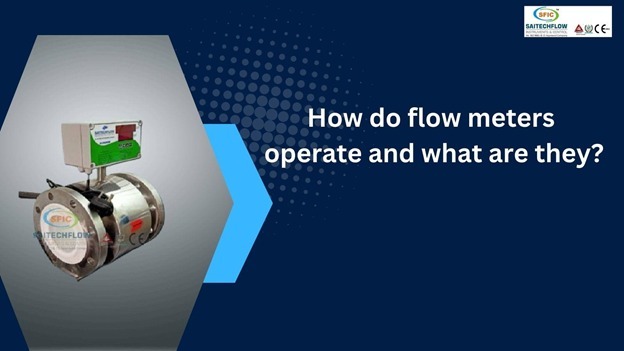How do flow meters operate and what are they?

Flow meters are essential measurement devices for many commercial and industrial functions. They have many applications, such as water leak monitoring, wastewater treatment, etc. Flow meters are an indispensable part of processes containing liquids, gases or vapors. Without the ability to monitor fluid flow, operators often cannot control flow.
Panametric flow meters improve facility safety, efficiency and profitability through Accurate and reliable flow measurements. This blog covers flow meters in detail so you can make an informed decision when choosing.
What is a flow meter?
A flow meter (also called flow rate sensor) is an instrument used to measure the linear or nonlinear mass or volumetric flow rate of a liquid, gas or vapor. These devices can measure the liquid, gas or vapor flowing through it over a specified period of time. They can also measure the total amount of material that has passed through them.
Panametrics offers clamp-on and inline flow meters. Inline flow meters have flow lines installed in the process line and an integrated flow regulator that improves the characteristics of process liquids, gasses or vapors. With clamp-on flow meters, you can choose the measurement location without interrupting the production process. They are easy to install without stopping the process and versatile for a wide range of industries, materials and pipe thicknesses.
How do flow meters work?
All flow meters have essentially the same purpose: to measure flow by recording the amount of liquid, gas or vapor passing through the device. However, they don't necessarily do it the same way. It depends on the type of flow meter you are using.
The operating principle of ultrasonic flow meter is based on transit
Example: ultrasonic flow meter uses ultrasound to measure the rate and volume of liquid, gas or vapor circulating in a pipeline. A signal is sent to the substance downstream in ultrasonic frequency. Another signal is sent against the substance circulating upstream. This type of flow meter measures and compares two ultrasonic transmissions. Using this data, you can calculate different types of data, such as flow rate or volume.
Magnetic flow meters, on the other hand, use a magnetic field to measure the flow rate of liquid. , gas or vapor. through a device, such as a pipe. When a substance, such as a liquid, passes through the created magnetic field, it generates a voltage depending on the speed. Faster fluids generate more voltage than slower flows.
What industries use flow meters?
Flow meters are essential needed in many different industries. Below are three industries that depend on flow meters.
Oil and Gas
Oil and gas production requires flow meters for many reasons. The main objective is to measure the volume of liquids and natural gases at various points in the process. Oil and gas industries must accurately measure flows whether they are pure or not, as well as when they flow over long distances. The oil industry uses flow meters to measure the amount of oil flowing from one point to another. The oil and natural gas industries both utilize flow meters for similar purposes. They need flow meters to display and record the amount of air being circulated and processed. Flow meters are used by the oil and gas industry to record and track their numerous systems and processes.
Water and wastewater services
From wastewater to drinking water, meters Flow measurement is essential for the water and wastewater service industry. The water sector is currently facing major challenges due to rapid urbanization, climate change and increasing customer demand; Therefore, the industry must accurately measure wastewater, such as wastewater and other wastes. Flow meters can prevent blockages in systems that contain thicker wastewater, such as sludge. Water utilities also need flow meters for drinking water. They must accurately measure the amount of water reaching each area, just like in a municipal network. This is important so that everyone has access to clean drinking water.
Food and beverage
The food and beverage industry is often characterized by high water consumption and water consumption. significant emissions. For this reason, they face significant costs for water supply and commercial wastewater treatment.Water supply and waste treatment costs increase global competition in the food and beverage industry, increasing raw material costs and energy supply rates. promotes the importance of having more efficient and optimized manufacturing processes.
We're here to help
Saitechflow Instruments & Control, a Baker Hughes company, is a leader in gas, steam, refrigerator and mobile measurement applications. Our extensive portfolio of expertise, online and available, helps you optimize processes and achieve environmental and performance goals. Control & Instrumentation Experts Saitechflow is ready to listen to your case. Contact us today to learn more about our flow meters and how they can help meet your business needs.



